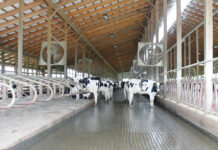
MOUNT HOPE, Ohio — Switching your dairy herd to a grain-free operation is a big decision that requires careful planning and insight.
That was part of the message that three dairy farmers tried to get across during a panel discussion at the fourth annual Organic Farming Conference, held Nov. 8-9 at the Mt. Hope Event Center.
“Make a plan in advance, so that you’re not doing that sudden stop,” advised Cheyenne Christianson, who operates an 80-cow dairy in northwestern Wisconsin. His family joined Organic Valley in 1999 and their organic herd has been grain-free for 20 years.
Other panelists were Aaron Hershberger, a dairyman from Mount Hope who gave up the grain in 2017, and Brent Beidler, an organic farmer from Vermont, who recently sold his grain-free herd. The panel was moderated by dairy farmer Myron Martin, who operates Peace Hollow Farm, a grain-free operation near Knoxville, Maryland.
Pasture acres
According to the panelists, dairy graziers need to account for additional pasture needs, drought and inclement weather, and the unique challenges and opportunities of where they farm. Martin reminded those attending to think of unique circumstances in their own region, including the weather patterns and also the ability of the soil to produce enough forage.
Grain-free dairies can use grazing during the growing season, but they also have options with dry hay and baleage, which allows them to bale and wrap at higher moisture. And, based on experience, the panelists said the cows often prefer the baleage over the dry hay.
Cow behavior
Hershberger said it’s also important to watch the cows, and learn from their behaviors. As a young dairyman, he said he often has more questions than answers, but he’s learning a lot just by watching cow behavior, and what they will and will not eat.
Grain-free dairy farmers can also feed supplements, as needed, but they come at a cost. Molasses is a common supplement, although there are many others.
Christianson said his goal is to be self-sufficient as a dairy farm, producing as much of his feed and bedding as possible. But other panelists said that even when they have to buy from other farms, it’s not necessarily bad, because it’s a way of bringing in more nutrients that end up in the pasture.
Asked about the greatest challenge to profitability, Christianson said it’s often balancing the number of cows to the farm. In his case, he said he probably has more cows than he needs, but cutting back takes a planned effort.
Hershberger said his biggest challenge is improving soil fertility and cow genetics.
Farmers often see a decrease in milk production when going grain-free, but production can be rebuilt over time, the panelists said.
Sometimes, grain-free dairies just flat out have to be creative, and determined.
“When you put yourself in a situation, or the situation puts you in a situation, and you have to, you will,” Martin said.
Other topics
The keynote speaker for the day was Gary Zimmer, an organic farmer and founder of Midwestern BioAg, a soil health and nutrient company based in Wisconsin, and with a location in Bellefountaine, Ohio.
Zimmer gave two talks on the importance of soil biology and how to test and prepare soils in a way that “gets biology working.”
He is known as the “father of biological farming,” and has authored books on the topic, and given speeches internationally on how to build and maintain healthy soils.
The two-day event also included sessions on raising organic row crops, beekeeping, heritage livestock breeds, organic vegetable production, and various cooking and home care sessions.









